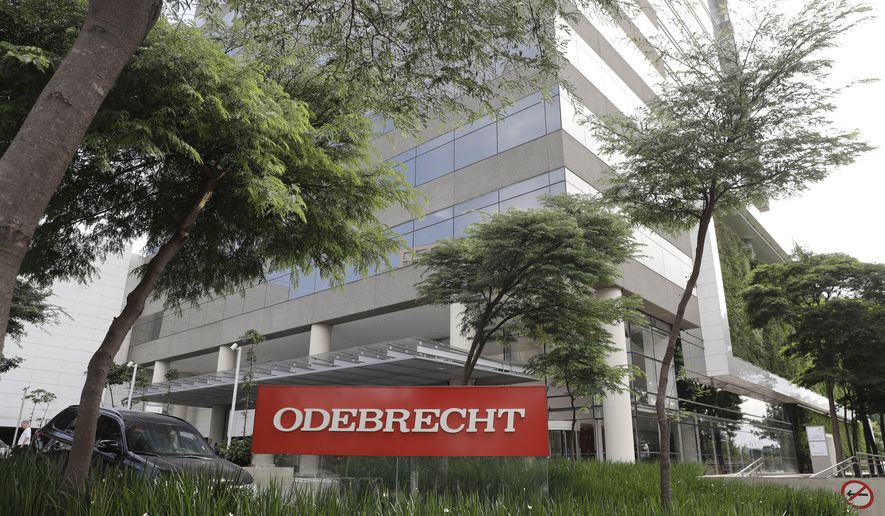RIO DE JANEIRO (AP) - Across Latin America, prosecutors have been pressing charges in recent years against politicians accused of corruption in the scandal involving Brazilian construction giant Odebrecht, which admitted to paying $800 million in bribes in the region.
Not in Mexico.
Evidence that could shed light on bribes paid by the company in Mexico has been held up in Brazil for more than a year because Mexican prosecutors have refused to sign off on terms necessary for an exchange of information, Brazilian prosecutors told The Associated Press this week.
They said signing the document is “mandatory” for Mexico to be able to use the information, which has been provided by Odebrecht executives and witnesses under plea agreements reached with the South American nation’s public ministry.
About a dozen other countries from Panama to Peru signed agreements with Brazil similar to the one required of Mexico, and used the evidence to go after officials as high as presidents and vice presidents.
Mexico and Venezuela, however, are two notable exceptions. No one in either nation has been formally charged in the Odebrecht scandal even though there are indications that bribes were paid in the countries.
The Mexican federal Attorney General’s Office did not respond to multiple requests for comment.
In late 2016, Odebrecht and Braskem, a petrochemical subsidiary, reached an agreement with American, Brazilian and Swiss justice officials to pay $3.5 billion in penalties in what the U.S. Department of Justice called “the largest foreign bribery case in history.”
As part of that, Odebrecht divulged details on bribes across several countries. It said it paid $10.5 million to officials at Mexico’s state-run oil company, Petroleos Mexicanos, or Pemex, between 2010 and 2014.
The following year the scandal erupted in Mexico with the emergence of a series of videos of testimony from former Odebrecht executives, including the ex-director of Odebrecht Mexico, Luis de Meneses, directly implicating Pemex’s former chief, Emilio Lozoya.
Lozoya, who in 2012 worked on the electoral campaign of current President Enrique Pena Nieto and for his Institutional Revolutionary Party has denied receiving bribes.
In the videos, the Odebrecht executives provide details on how de Meneses allegedly helped them land contracts and how they paid him for greasing the wheels.
Despite that evidence, there has been no sign from Mexican prosecutors that the investigation has advanced. They say they have interviewed 19 current and former Pemex officials as well several Odebrecht executives, including convicted ex-CEO Marcelo Bahia Odebrecht.
But Mexican prosecutor also say they are still waiting for Brazil to provide its evidence.
Brazilian prosecutors say Mexico is to blame for the holdup.
“The Brazilian prosecutor’s office has been waiting for the Mexican prosecutor’s office to sign the terms of agreement regarding the plea bargain of Odebrecht executives since August 2017,” the office said. “Signing this document is mandatory so Mexico’s public ministry may use information supplied by the collaborators.”
“To have access to the information,” it continued, “interested countries must respect rules such as refraining from using the information against the collaborators. Since the Mexican prosecutors’ office still has not signed the terms or justified why it has not signed them, the Brazilian prosecutors’ office is not in a position to pass on the requested information.”
Furthermore, the office added, it is still waiting for Mexico to correct errors in documentation.
In a statement issued in August 2017, Mexican prosecutors said Odebrecht representatives had offered “a reparations agreement which has not been accepted,” but it not known if that agreement was related to the current holdup.
Experts say Mexico’s lack of interest in prosecuting the case appears to be politically motivated.
“In the case of Mexico, it has to do with the lack of an independent attorney general and, I assume, it has to do with people around the president … who are also linked to the case,” said Jose Ugaz, president of the Transparency International chapter of Peru.
___
Associated Press writer Beatrice Christofaro reported this story in Rio de Janeiro and AP writer Maria Verza reported from Mexico City.




Please read our comment policy before commenting.